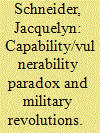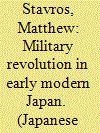| Srl | Item |
| 1 |
ID:
167677


|
|
|
|
|
| Summary/Abstract |
The Information Revolution, or the rise in computing power, allowed states to leverage digital capabilities to exert conventional military dominance. But does it also create vulnerabilities that lead to war? In this piece, I examine the relationship between military revolutions and conflict initiation and identify a capability/vulnerability paradox that suggests the degree of capability dependence created by a military revolution combined with the ability of adversaries to exploit vulnerabilities creates potential pockets of dangerous instability. These indicators suggest that greater centralisation and data dependencies could move the Information Revolution towards incentives for instability.
|
|
|
|
|
|
|
|
|
|
|
|
|
|
|
|
| 2 |
ID:
124530


|
|
|
|
|
| Publication |
2013.
|
| Summary/Abstract |
Military changes that took place in Japan during the late sixteenth century bear a striking resemblance to those in Europe at about the same time. This essay argues that the Roberts thesis of military revolution - widely applied to Europe - provides a useful framework for identifying a series of cascading developments that, once realized, constituted the fundamental elements of a similar revolution in early modern Japan. These included: the almost universal adoption of firearms, the development of tactics for the effective deployment of those firearms, and finally, a change in the composition and organization of armies leading to the professionalization of warfare. Most important, by revolutionizing the way armies were organized and wars were fought, Oda Nobunaga and Toyotomi Hideyoshi contributed directly to the emergence of new notions of centralized authority that were critical to the creation of a unified and peaceful early modern state.
|
|
|
|
|
|
|
|
|
|
|
|
|
|
|
|
| 3 |
ID:
129493


|
|
|
|
|
| Publication |
2014.
|
| Summary/Abstract |
This paper uses a formal model to analyze the effects of political military competition among states on the size and composition of state. Great economies of scale in warfare, even distribution of military capability among contestants and greater value of contested resources generate higher level of military capacity and growth of government. If there is decreasing return to scale in state revenue generating function and provision of public intermediate inputs, then there will be an increasing size of civilian public sector relative to that of military. The paper finally studies how waves of military revolutions affected international political military competition and the size and composition of government in history.
|
|
|
|
|
|
|
|
|
|
|
|
|
|
|
|
| 4 |
ID:
046463


|
|
|
|
|
| Publication |
Cambridge, Polity Press, 2001.
|
| Description |
vi,169p.
|
| Standard Number |
0745625215
|
|
|
|
|
|
|
|
|
|
|
|
Copies: C:1/I:0,R:0,Q:0
Circulation
| Accession# | Call# | Current Location | Status | Policy | Location |
| 045236 | 355.02/HIR 045236 | Main | On Shelf | General | |
|
|
|
|